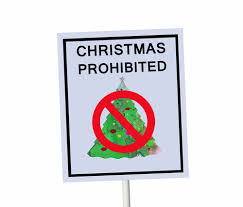Christmas was BANNED in the USA for 260 years by White Christian Protestants because it was too PAGAN!
[I was astounded to come across references which indicate that Christmas might have been banned in the USA for various periods of time. I’ve never heard of this before in my life and I was not sure whether this is true. But it seems to be. So I’m going to reproduce various articles which say this and I’m interested in feedback. This is a brand new topic for me. I had never thought about Christmas as something that might have been banned once upon a time.
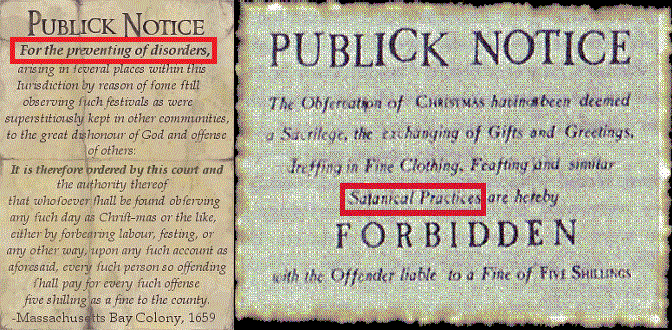
What is very interesting is that it was clear to the whites back then that Christmas is really a PAGAN holiday and that’s why they banned it!
What we whites must keep in mind is that many of those whites who left Europe were religious people who had their own ideas. South Africa, and the Boers especially are a people made up of Christians who wanted to worship their own way. i.e. They were a hard headed lot and not into being ordered around! So some of the more rebellious whites may have left Europe for distant shores and adventures.
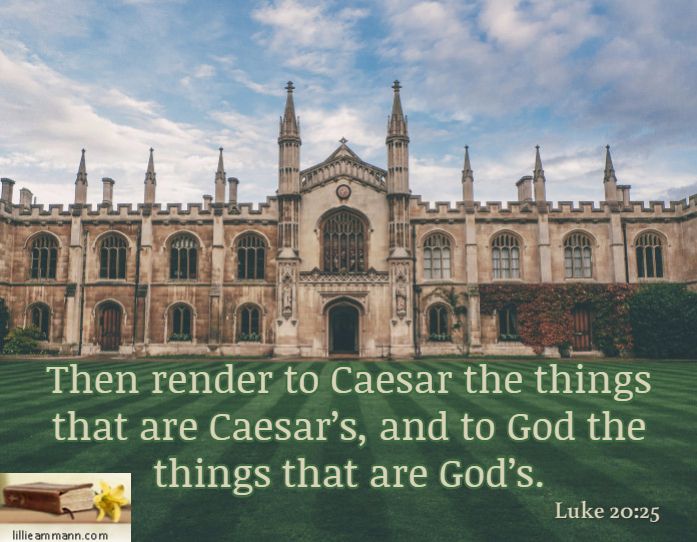
NB: Notice below in the Wikipedia article that Christmas was celebrated by Roman Catholics and other non-Protestants. From my little bit of study of Christianity it appears clear to me that Christianity’s growth was due to political expediency rather than because people were truly believers of it. For example, Christianity came into being officially as a move by Constantine the Great, a Roman Emperor in the final fading days of the Roman Empire. He gathered together a conference at Nicea where they formalised the belief system from various sources into a single thing. Also there is the Christian concept of the Divine Right of Kings, which to me reeks of political agreement.
Another hint of political deals in the Bible is in Luke where it says: “Render unto Caesar” – in other words, you must pay your taxes.
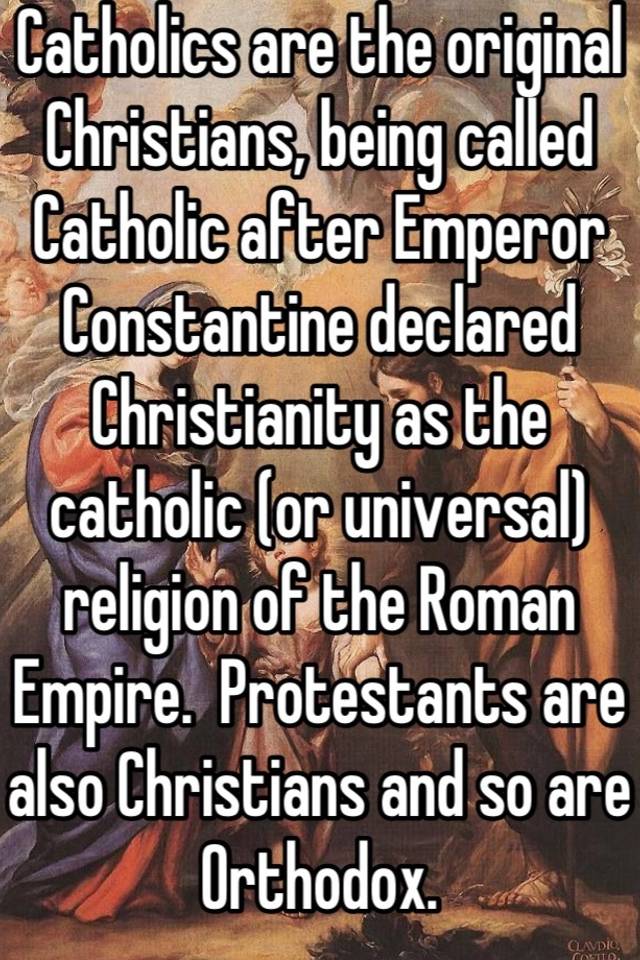
To me it seems clear that the Catholic Church went on, after the fall of Rome to endorse Kings and to use its power to give Kings “divine legitimacy” in exchange for operating in their countries. The Catholic Church exercised extreme power over all of Europe after the fall of the Roman Empire. There is a story a European friend told me of a Pope making a King wait out in the snow for him for a few days until the Pope decided it was time to see the King. The Pope was more powerful than Kings!
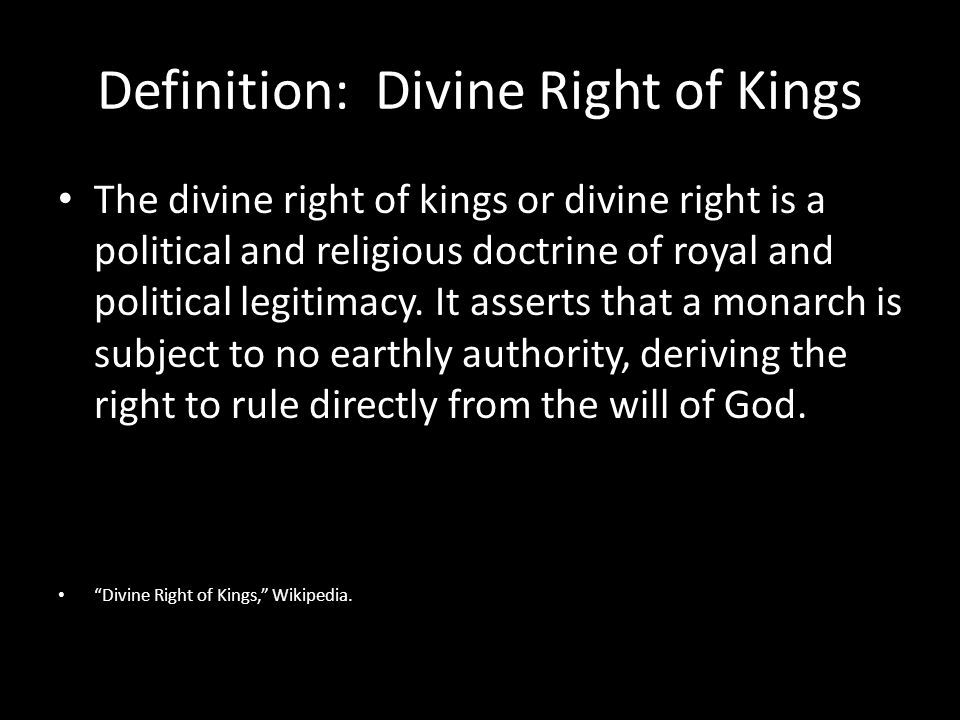
Just as an aside, the Catholic Church even had some access to soldiers and fleets. At the Battle of Lepanto, the Pope sent his own ships of his own fleet to join the other ships from Christian countries.
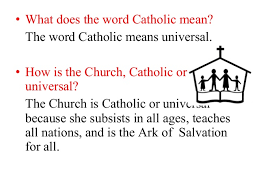
As Alex Linder points out, correctly, the term “Catholic” means “universal”. Catholicism was intended to be the universal religion of the Roman Empire. From my viewpoint this was probably a totally disastrous move by Constantine because the entire Empire collapsed less than a century later. I don’t think the long term effect was what he had hoped it would have. The Roman Empire collapsed because they couldn’t find any men who wanted to fight the invading Barbarians. It was not that the Barbarians were such awesome warriors. It was that the Romans lost their taste for fighting altogether and Christianity seems to have been the prime driver in that process.
Constantine thought that a single religion would help the empire. But the Roman Empire originally had no religious problems. In fact it was totally religiously tolerant and had over 160 religions. It was ONLY CHRISTIANITY that the Romans took a great dislike to. So one needs to ask the question: Why? We’ll return to that later because the fall of the Roman Empire along with the rise of Christianity is no coincidence. This is what the historian Gibbons dug into in tremendous detail centuries ago. He was convinced that it was Christianity that destroyed the greatest state and empire that had come out of Europe.
Christianity has therefore only been around for 1,700 years and it only came OFFICIALLY into being more than 300 years after Jesus.
I also came across a fascinating reference to the original, early Christians in the Roman Empire. Apparently Christians were all circumcised! The original Christians saw themselves as the real Jews and they behaved according to “Abrahamic law” and circumcision was one of the things they practised! Now circumcision is something that the Jews see as “the mark of a real Jew” and in any nation they move into it is one of the first “freedoms” the Jews insist on.
The original Christians were thus very different to the ones who came along later “officially”. There are other indications that Christianity is the result of compromise with Pagan beliefs. Clearly, Christianity as created by the final, ailing, Roman Empire was a total political move. They had to find ways to convert European Pagans to this new religion and there are other indications of such compromises. Its a fascinating topic. It was perhaps the greatest psychological experiment ever foisted on the white race at that time. Clearly Constantine believed there was a BIG BENEFIT to this move for the state otherwise he would not have done it.
The Romans I might add, had a very long history of keeping their traditions. They were very deeply religious (in their Pagan ways), and they also kept their traditions with great determination. Then Christianity came and was forced down on everyone from the top. So to me, Christianity does not seem like a “bottom up” success, but in fact a “top down” event that was forced upon the Empire, presumably to hold it together, which seems to have been a singular spectacular failure.
So while the term “Catholic” means universal, the fact is that Christianity became a religious monopoly across all of Europe!
When I look at us whites today, it really seems clearer than ever that we whites MUST be allowed FREEDOM OF RELIGION. We must allow whites to form their own beliefs and to choose. In that sense, I think a return to the Roman way of freedom of religion before Christianity is the best way forward. We must focus our unity on our race as Hitler and Rockwell saw. We MUST start with RACE and blood. That binds us as family.
There was a successful Christian Empire after the fall of the Roman Empire in the West, where it was white. It was the Eastern Roman Empire that continued on for 1,000 years with Christianity. It quietly faded away and morphed into something else over centuries. So why did the white, Western Empire collapse but the Eastern one went on to survive and mutate into something utterly different?
The Byzantine Empire as the Eastern Empire came to be known has never really excited me. I’ve never come across anything in particular that I thought was outstanding about it. But it was Christian for a thousand years and so its worth comparing this Empire to western Roman Empire that preceded it which was filled with so many outstanding things. Jan]
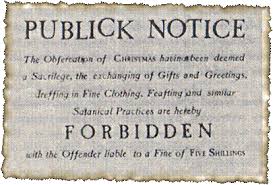
Firstly let’s look in Wikipedia what it says, as Liberally unreliable as it is:
Protestantism
Prior to the Victorian era, Christmas in the United States was primarily a religious holiday observed by Roman Catholics, Episcopalians, and Lutherans. Its importance was often considered secondary to that of Epiphany and Easter.
As was the case with other Christian holidays, Christmas borrowed elements from pagan peoples, including yule logs and decorations such as candles, holly, and mistletoe. Christmas trees were seen as pagan in origin. During the various Protestant reformations, these paganizing elements were a source of controversy. Some sects, such as the Puritans, rejected Christmas as an entirely pagan holiday. Others rejected certain aspects of Christmas as paganizing, but wanted to retain the “essence” of the holiday as a celebration of the Christ’s birth. This tension put in motion an ongoing debate within some Protestant denominations about the proper observance of Christmas.[35]
19th century
According to historian Ronald Hutton, the current state of observance of Christmas is largely the result of a mid-Victorian revival of the holiday, spearheaded by Charles Dickens. In A Christmas Carol, Hutton argues, Dickens sought to construct Christmas as a family-centered festival of generosity, in contrast to the community-based and church-centered observations, the observance of which had dwindled during the late 18th and early 19th centuries.[36]
Historian Stephen Nissenbaum contends that the modern celebration in the United States was developed in New York State from defunct and imagined Dutch and English traditions in order to refocus the holiday from one where groups of young men went from house to house demanding alcohol and food into one centered on the happiness of children. He notes that there was a deliberate effort to prevent children from becoming greedy in response.[35] Christmas was not proclaimed a holiday by the United States Congress until 1870.[32]
Source: https://en.wikipedia.org/wiki/Christmas_controversies
On the website LiveScience they have this article:
The Surprising Truth: Christians Once Banned Christmas
It may seem like Christmas has always been celebrated in the United States, but that’s not the case. In fact, the joyous religious holiday was actually banned in America for several decades by Christians themselves.
The original war on Christmas was waged during the sixteenth and seventeenth century by Puritans, or Protestant Christians who believed that people needed strict rules to be religious and that any kind of merrymaking was sinful.
“Shocking as it sounds, followers of Jesus Christ in both America and England helped pass laws making it illegal to observe Christmas, believing it was an insult to God to honor a day associated with ancient paganism,” according to “Shocked by the Bible” (Thomas Nelson Inc, 2008). “Most Americans today are unaware that Christmas was banned in Boston from 1659 to 1681.”
All Christmas activities, including dancing, seasonal plays, games, singing carols, cheerful celebration and especially drinking were banned by the Puritan-dominated Parliament of England in 1644, with the Puritans of New England following suit. Christmas was outlawed in Boston, and the Plymouth colony made celebrating Christmas a criminal offense, according to “Once Upon a Gospel” (Twenty-Third Publications, 2008).
Christmas trees and decorations were considered to be unholy pagan rituals, and the Puritans also banned traditional Christmas foods such as mince pies and pudding. Puritan laws required that stores and businesses remain open all day on Christmas, and town criers walked through the streets on Christmas Eve calling out “No Christmas, no Christmas!”
In England, the ban on the holiday was lifted in 1660, when Charles II took over the throne. However, the Puritan presence remained in New England and Christmas did not become a legal holiday there until 1856. Even then, some schools continued to hold classes on December 25 until 1870.
Although the change was gradual, people began to once again embrace the holiday until Christmas as we know it today complete with mistletoe, eggnog and candy canes was celebrated throughout the American colonies.
Source: https://www.livescience.com/32891-why-was-christmas-banned-in-america-.html
I hate the idea of having to quote the Liberal scum HuffingtonPost, but on this occasion have have to because they seem to have a pretty decent article on this. Though, as with everything Liberal one should check it always:
Christmas – Ancient Pagan Holiday Which Was Criminally Illegal Until 1907
The origins of Christmas are pretty much well known. There was a whole virgin birth in a manger while trekking across Africa or something, but what is less well known is that it was originally a pagan holiday which was criminalised until 1907 in the US.
It was in 601 that Pope Gregory I wrote to Melitus (his missionary in England) telling him “not to stop such ancient Pagan festivities” but to “adapt them to the rites of the Church, only changing the reason of them from a heathen to a Christian impulse”. So all those who have been claiming for years that Christmas was, in fact, actually a pagan holiday – you were right and Pope Gregory I handily put it in writing for you.
That said, Christmas also moved around the globe between 900 – 1000 Common Era (C.E.) and was adapted to match their winter celebrations there as well. Christmas evolved slowly and gradually, with no firm mention of it until the mid 11th century, where we actually find the first reference to it. It evolved and changed and grew to become what we now recognise with egg nog and a tree, but it was not without its detractors.
In England, parliament banned Christmas for 12 years from 1647 under Cromwell. That ban was lifted only for it to be imposed in the Massachusetts Bay Colony in 1660. This ban on Christmas, becoming law in many places, lasted until the apparently progressive state of Alabama was the first US state to legalise Christmas in 1836, meaning there was almost 200 years during which it was criminal to celebrate Christmas in the US. Oklahoma became the very last state to make Christmas legal again in 1907 despite the US making it a federal holiday in 1870.
So while you may have known that Christmas was originally pagan festival, you might not have known that in the UK it was made illegal for 12 years and in the US it was illegal for 260 years. Want to know more? Check out this really amazing infographic all about Christmas here: The History of Christmas

